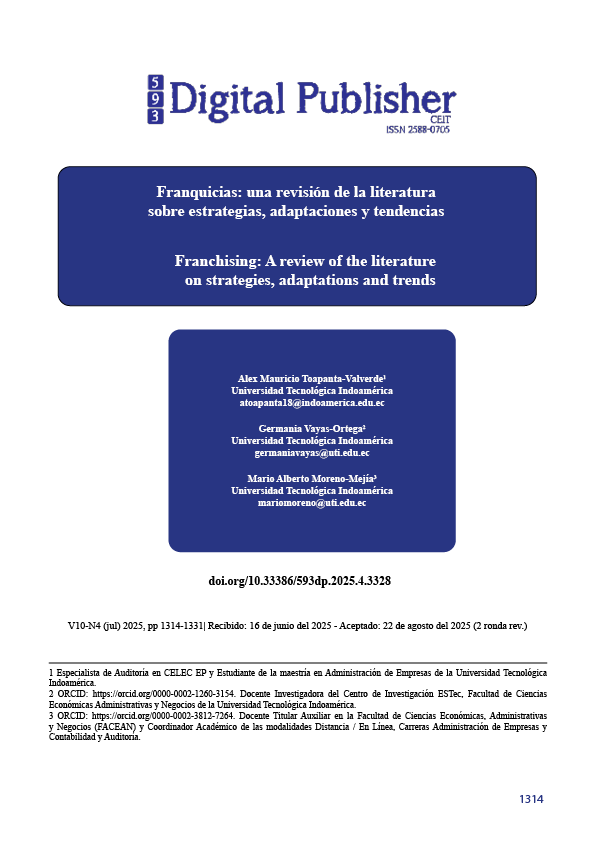Franchising: A review of the literature on strategies, adaptations and trends
Main Article Content
Abstract
Business models define how organizations create, deliver, and capture value, and the franchise model has demonstrated sustained global growth since the nineteenth century. In the current environment, characterized by technological change, evolving consumer behavior, and increasing sustainability demands, it is essential to understand the strategies, adaptations, and trends that determine franchise success and expansion. This study aims to identify the factors influencing the viability of the franchise model in today’s context. A mixed-method approach was applied, combining a bibliometric analysis of 1,198 publications indexed in Scopus between 2000 and 2025 with a systematic review of 36 articles selected under the PRISMA protocol. Results reveal the expansion of franchises into emerging sectors such as healthcare, digital platforms, and learning systems, while reinforcing the importance of traditional factors such as brand consolidation, process standardization, know-how transfer, financial sustainability, innovation, technology, and regulatory frameworks. The findings suggest that franchise success depends on the balanced integration of these elements, with innovation and technology acting as strategic enablers and sustainability emerging as a non-negotiable dimension. Finally, a conceptual framework is proposed to synthesize these factors, providing guidance for both academic research and managerial practice in evaluating and implementing effective, adaptable, and sustainable franchise models.
Downloads
Article Details

This work is licensed under a Creative Commons Attribution-NonCommercial-ShareAlike 4.0 International License.
1. Derechos de autor
Las obras que se publican en 593 Digital Publisher CEIT están sujetas a los siguientes términos:
1.1. 593 Digital Publisher CEIT, conserva los derechos patrimoniales (copyright) de las obras publicadas, favorece y permite la reutilización de las mismas bajo la licencia Licencia Creative Commons 4.0 de Reconocimiento-NoComercial-CompartirIgual 4.0, por lo cual se pueden copiar, usar, difundir, transmitir y exponer públicamente, siempre que:
1.1.a. Se cite la autoría y fuente original de su publicación (revista, editorial, URL).
1.1.b. No se usen para fines comerciales u onerosos.
1.1.c. Se mencione la existencia y especificaciones de esta licencia de uso.
References
Adie, B. A. (2017). Franchising our heritage: The UNESCO World Heritage brand. Tourism Management Perspectives.
Alon, I. (2018). Service franchising: A global perspective. Springer.
Amit, R., & Zott, C. (2020). Business model innovation strategy. Wiley.
Arenas Torrado, M. K. (2017). Franquicias: Oportunidad de negocios para la competitividad de restaurantes y comidas rápidas en Cúcuta. Desarrollo Gerencial, 9(2), 158-173.
Barthélemy, J. (2011). Agency and institutional influences on franchising decisions. Journal of Business Venturing, 26(3), 325–336.
Baskin Totesaut, R. J. (2024). Las franquicias, estrategia publicitaria de una sola vía. Quetiones Publicitarias, 8(35), 21-28.
Boulay, J., Caemmerer, B., & Duniach, K. (2020). Multi-unit franchising from franchisor and franchisee perspectives. Journal of Business Research, 108, 381-393.
Calderón, J., Flores, R., & Núñez, C. (2017). Economic sustainability in franchising: A model to predict franchisor success or failure. Sustainability, 9(12), 2356.
Carvalho, S. (2020). Revisiting the franchise contract. Juridical Tribune, 10(2), 55-67.
Cochet, O., Dormann, J., & Ehrmann, T. (2008). Capitalizing on franchisee autonomy: Relational forms of governance. Journal of Small Business Management, 46(4), 528–553.
Combs, J. G., Michael, S. C., & Castrogiovanni, G. J. (2004). Franchising: A review and avenues to greater theoretical diversity. Journal of Management, 30(6), 907–931.
Crespo Ruco, A. (2021). Disrupt!Canvas: A template for sketching and assessing potentially disruptive businesses. ISCAC, Coimbra.
Dant, R. P., Grünhagen, M., & Windsperger, J. (2011). Franchising research frontiers for the twenty-first century. Journal of Retailing, 87(3), 253–268.
Doherty, A. M. (2009). Market and partner selection processes in international retail franchising. Journal of Business Research, 62(5), 528–534.
Elango, B. (1997). A literature review and synthesis on franchising. Journal of Small Business Management, 35(3), 68–81.
Ghantous, N., & Christodoulides, G. (2020). Franchising brand benefits: An integrative perspective. Industrial Marketing Management, 87, 193–205.
Grunhagen, M., & Sadeh, T. (2021). Legal frameworks in franchising: Contracts and disclosure. Small Business Economics, 57, 1189–1206.
Jashari, A., & Osmanaj, V. (2019). Legal treatment of franchise in Northern Macedonia and Republic of Kosovo. European Journal of Economics and Business Studies, 5(2), 49–56.
Kitchenham, B., Brereton, O. P., Budgen, D., Turner, M., Bailey, J., & Linkman, S. (2009). Systematic literature reviews in software engineering. Information and Software Technology, 51(1), 7–15.
Kotler, P., & Keller, K. L. (2021). Dirección de marketing. Pearson Educación.
Lee, H., Kim, J., & Park, Y. (2021). Effects of marketing decisions on brand equity and franchise performance. Journal of Business Research, 134, 623–632.
Mendelsohn, M. (2015). The franchise debate: Global standardization vs. local adaptation. Franchise Law Journal, 35(1), 55–64.
Michael, S. C. (2022). Investing in entrepreneurs: The case of franchising. Wisconsin: Lubar.
Moher, D., Liberati, A., Tetzlaff, J., & Altman, D. G. (2010). Preferred reporting items for systematic reviews and meta-analyses: The PRISMA statement. International Journal of Surgery, 8(5), 336–341.
Navarro, A., & Puig, F. (2018). Knowledge transfer and adaptability in international franchises. Service Industries Journal, 38(11–12), 777–794.
Osterwalder, A., & Pigneur, Y. (2010). Business model generation. Wiley.
Page, M. J., et al. (2021). The PRISMA 2020 statement. BMJ, 372, n71.
Panda, T., Dash, S., & Pradhan, R. (2023). Opportunism in an emerging market – franchisee perspective. Journal of Business Research, 156, 113462.
Pruneda, G. (2025). Efecto de las actividades del modelo de negocios en el éxito emprendedor. Universidad de Cantabria.
Rodríguez, R. (2021). Diseño de instrumento para la medición de factores de éxito. Revista CEA, 7(14).
Rosado-Serrano, A., Paul, J., & Dikova, D. (2018). International franchising: A literature review and research agenda. Journal of Business Research, 85, 238–257.
Santos, R. (2024). El futuro de las franquicias: Tecnologías de información e inteligencia artificial. AECEA Journal, 5(2).
Seijas-Díaz, J. G., et al. (2024). Perspectiva organizacional en el modelo de negocios. Revista Científica Bibliotecas, 20(2), 1–14.
Stanworth, J. (1995). The franchise relationship. Journal of Marketing Channels, 4(1–2), 161–176.
Subawa, N., Widhiasthini, N. W., & Permatasari, N. (2020). Local brand franchise competition in the disruption era. International Journal of Innovation, Creativity and Change, 12(3), 234–250.
Teece, D. J. (2010). Business models, business strategy and innovation. Long Range Planning, 43(2–3), 172–194.
Toniut, H. (2020). El uso del modelo de negocio para la innovación empresarial. Palermo Business Review, 22, 139–156.
Tranfield, D., Denyer, D., & Smart, P. (2003). Towards a methodology for developing evidence‐informed management knowledge. British Journal of Management, 14(3), 207–222.
Vayas, G., Espinoza, M., Ríos, M., & Suárez, J. (2025). Technological elements affecting SMEs: A bibliometric and theoretical review. Information Technology and Systems, 46–54.
Villalobos, J. (2024). El modelo de negocio. Universidad de los Andes.
Vysocan, O., Hlibko, S., & Onyshchuk, Y. (2022). Accounting of franchising activities of tourist enterprises of Ukraine. Problems and Perspectives in Management, 20(1), 456–467.
Yanahuana, D., & Vélez, A. (2022). Mejoras para un modelo de franquicias. Revista Neuman, 12(4), 50–64.
Young, J. (2016). Racial logics, franchising, and video game genres. Games and Culture, 11(1–2), 155–174.
Zhang, H., & Chen, W. (2024). Information disclosure in franchising systems. Journal of Chinese Economic and Business Studies, 22(1), 1–17.
Zolfagharian, M., & Naderi, I. (2020). Human resource management challenges facing franchise businesses. Journal of Strategic Marketing, 28(4), 342–359.




